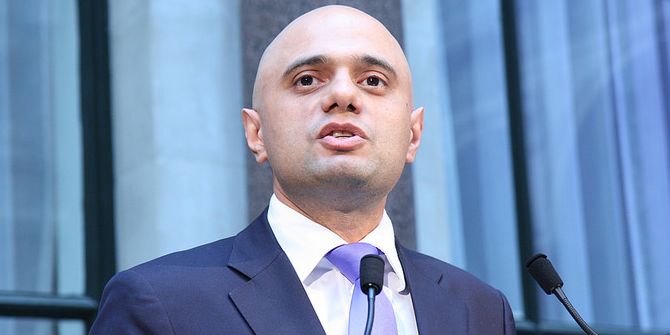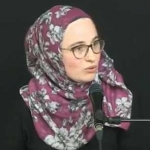The debate on the UK’s counterextremism strategy Prevent has been extremely polarised for many years and has left some Muslim communities in this country feeling marginalised and alienated. The Home Secretary’s most recent comments associating critics of Prevent with “extremists” have furthered this polarisation. Jennifer Philippa Eggert explains why Javid’s comments are concerning and which course of action the Home Secretary and his government should instead take.

Sajid Javid attacks critics of Prevent
Sajid Javid has attacked critics of the British government’s counterextremism strategy Prevent for being ‘on the side of the extremists’. The Home Secretary claimed that there are organisations in the UK which use false information to ‘turn people away’ from Prevent, which is the part of the UK’s counterterrorism strategy aimed at preventing violent extremism and terrorism. When Javid was asked if the agenda’s name should be changed as some have proposed, he responded: ‘The thing about the name is that if you didn’t call it Prevent, whatever other name we chose I’m sure there would be people trying to attack it because they actually are on the side of extremists.’ While the Home Secretary did not name any organisations, it has been suggested that his comments were targeted at organisations such as CAGE, Prevent Watch and the Muslim Council of Britain, who have strongly condemned the Prevent agenda in the past.
It must be possible to criticise Prevent
Javid’s comments are deeply concerning. It must be possible to criticize Prevent, point out its flaws (which do exist, both on a practical and a conceptual level) or downright reject it, without being accused of “being on the side of extremists”. Previous critics of Prevent have focused both on the design and the effect of the counterextremism policy. The evidence that highlights how Prevent has caused and perpetuated feelings of fear, mistrust and marginalization in large parts of Muslim communities in the UK is clear. Critics of Prevent include the Open Society Justice Initiative, the UN’s Special Rapporteur on the Right to Freedom of Assembly, the UK’s terror watchdog as well as numerous academics. According to the logic inherent to Javid’s comments, all of these would be “on the side of extremists”.
A dangerous precedent
Javid’s comments must be challenged, because they set a dangerous precedent. We should not allow our government to smear critics and opponents and accuse them of siding with “extremists”. Healthy debate is part of a well-functioning democracy. When criticized, the government should listen and engage – and not smear critics in the way the Home Secretary has. This is of particular importance given that there is no agreed upon definition of what constitutes “extremism” in this country. This lack of a clear definition makes it very easy to discredit critical voices as being “extremist”. Do we really want to (continue) perpetuating an environment in which critics are being shut down and accused of being “extremist”? Or wouldn’t it be wiser to allow for critique, carefully consider it, and intelligently respond to it?
The Home Secretary should build bridges – not polarise further
The debate on Prevent (as well as the UK’s counterterrorism strategy more generally) has been extremely polarized and politicized. Heated discussions on the topic are common place, with different factions accusing each other of being “government sell-outs” and “extremists” respectively. In such an environment, it is even more important that a key political figure such as the Home Secretary focuses on building bridges instead of further fuelling the fire. Javid’s polarizing comments on critics of Prevent are so dangerous because they have the potential to divide even further, at a time when we would really need someone to bring people together and focus on the common good of the people living in this country.
Consider suitable means of engagement
In order to achieve that, it is imperative that the Home Secretary recognizes the responsibility he has vis-à-vis all residents of this country – not just the ones who agree with his policies. Rather than lashing out at his critics, Javid would do good to consider suitable means of engagement with those critical of Prevent. If when doing so, he finds that some people in this country refuse any kind of engagement with this government and its agencies when it comes to counterextremism (as was the case most recently with the Commission for Countering Extremism led by Sara Khan), then it is up to the Home Secretary – and this government more generally – to think about why that is the case. The relation between this government and parts of the Muslim communities in this country has been extremely polarized in recent years. However, blaming this just on “extremists” on the other side is too easy. Instead, the government would be well-advised to recognize the mistakes that have been made (and sadly, keep on being made) as part of its counterterrorism policies in general and in interactions with its Muslim citizens in particular.
About the author
 Dr Jennifer Philippa Eggert is a researcher, university teacher and practitioner working on gender, political violence, counterextremism, Islam(ism) and migration. She is Non-Executive Director of the social enterprise We Rise UK (which aims to empower Muslim women to counter injustice, sexism, racism and extremism) and Research Advisor of the Women Muslim Advisory Project. She tweets at @j_p_eggert.
Dr Jennifer Philippa Eggert is a researcher, university teacher and practitioner working on gender, political violence, counterextremism, Islam(ism) and migration. She is Non-Executive Director of the social enterprise We Rise UK (which aims to empower Muslim women to counter injustice, sexism, racism and extremism) and Research Advisor of the Women Muslim Advisory Project. She tweets at @j_p_eggert.
Note: This piece gives the views of the author, and not the position of the LSE Religion and Global Society blog, nor of the London School of Economics.






You don’t appear to differentiate between being extremist and ‘being on the side of’ extremists. This is a vital distinction which renders your argument meaningless. It is acknowledged that some of Prevent’s critics are motivated for other reasons, such as political inclination or a sincerely held belief that certain freedoms are being curtailed. This does not negate the fact that these people have (in some cases unwittingly) aligned themselves with groups that espouse extremist ideas. The fact that Britain First and other extreme right wing organisations have also come out against the Prevent Strategy (an important fact ignored in your article) would suggest that Prevent must be doing something right?